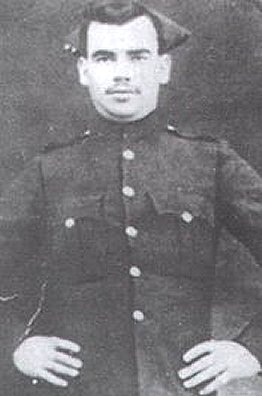William
Keneally V.C.

Birth: Dec. 26, 1886
Death: Jun. 29, 1915
World War I Victoria Cross Recipient. Keneally was born in Wexford,
County Wexford, Ireland, where his father was a colour sergeant in the
Royal Irish Regiment. When his father’s military service ended,
the family moved to Wigan, Lancashire, England, but not before surviving
the sinking of the SS Slavonia in the Azores in June of 1909. Keneally
started working in the Lancashire mines at age 13 as a pit boy, playing
football as a star member of the local team in his off hours, but after
ten years in the pits he decided on a military career, enlisting in
the 1st Battalion of the Lancashire Fusiliers in 1909 for a seven-year
hitch. Keneally was awarded the V.C. for action during the landings
at W Beach during the Gallipoli Campaign, April 25, 1915, one of the
group known in the press as "The Six V.C.s Before Breakfast"
(the others were Capts. R.R. Willis and C. Bromley, Sgts. A. Richards
and F.E. Stubbs, and L/Cpl. J.E. Grimshaw). Lance-Corporal Keneally’s
company was being held up at a barrier of unbroken wire, a problem exacerbated
by faulty maps, when he decided to deal with the situation on his own.
(He had already done great service as a runner, delivering messages
between positions under heavy enemy fire.) He belly-crawled to the obstructed
wire and tried to cut it; though he was ultimately unsuccessful, he
managed to return unscathed. Keneally’s V.C. was announced at the
same time as Capt. Willis and Serjt. Richards: “On 25th April,
1915, three companies and the Headquarters of the 1st Battalion, Lancashire
Fusiliers, in effecting a landing on the Gallipoli Peninsula to the
West of Cape Helles, were met by a very deadly fire from hidden machine
guns which caused a great number of casualties. The survivors, however,
rushed up to and cut the wire entanglements, notwithstanding the terrific
fire from the enemy, and after overcoming supreme difficulties, the
cliffs were gained and the position maintained. Amongst the many very
gallant officers and men engaged in this most hazardous undertaking,
Capt. Willis, Serjt. Richards, and Pte. Keneally have been selected
by their comrades as having performed the most signal acts of bravery
and devotion to duty." Keneally survived the three Battles of Krithia
during the Gallipoli Campaign, but was mortally wounded in the Battle
for Gully Ravine on June 28, 1915, and died the next day. His V.C. medal
is on loan to the Lancashire Fusiliers Museum, Bury.

